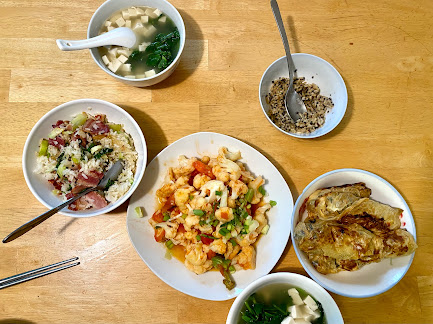周一(5/3/2021)
昨天晚上0:40第一次醒来,再次醒来就是2点,然后3点半,精准得让我都觉得可怕。一个半小时的Sleeping cycle。但是3点半之后几乎就是睡不着了,疼痛怎么也消除不了,而且都不知是肿胀引起的疼痛还是反之。有的时候让重力做功,会好一些,但是灵验得时候少。
早晨出门去跑步了,一英里开外,左脚开始发麻。跑回来后,做了腹部运动。
工作很忙,越忙就越有工作要做。
中午给她烤了鸡翅,我也吃了一堆。然后开车去买菜,还跑了两个地方。回家之后把东西收拾好,也是费了一番功夫。
看看我4月的读书观影记录。感觉就在追《六尺之下》。
下班后带狗狗出门,刚开到Mountain View Park,很小的雨,以为下不大,就铤而走险,没走几步,就被雨浇透了。有点气急败坏地回到车里,看到去接聪的时间还早,打电话给她,是否能早点去接她,她说油画比较tricky,干了之后,下次还得再怎么地怎么地的。所以算了,回家,老老实实地换一套干衣服,喝了一碗姜汤,在出门接她。
晚上参加门徒小组训练,没有想到被Helen一推就成了领的人了。
周二(5/4/2021)
昨天晚上0:40醒来,然后2:40醒来,有点意外,不是一个半小时,而是两个小时,然后就算难受醒过来也不看时间了,最后感到疼痛无法忍受,可能需要起来了,就看了一下时间,5点半。来到6点多起来的。之间,倒立也不行,正立也不行。
做了full-body strength。昨天跑步造成的结果就是浑身酸痛。每天不能剧烈运动,所以打算遛狗了。周四也不能运动,就算给自己的recovery day了。
中午去冬梅那里拿韭菜,没有想到一聊就聊了一个小时。她给了我一包韭菜,几个咸鸡蛋,还现拣了几个鸡蛋给我。
然后去她学校买Prom ticket。
然后图书馆。
然后去shoprite,说是就买酸奶,总是贼不走空地买了一些其他的。
回家后收拾,吃我用leftover ptai做的炒面,加了菠菜,鸡蛋,虾仁,蘑菇。胃慢慢地好起来吧。然后就着冬梅的咸鸡蛋喝了一点粥。
提早了十分钟下班,带狗狗走到Motngomery Park,4英里。回来汗流浃背,冲了个澡,还洗了头。走回家的时候,右腿还挺疼的。
然后做饭,问他要不要做三文鱼,他说不是油大的,不做了。
晚饭:
没有想到等待区域果然是social distance,并且特别地舒适,感觉比较开阔,而见医生的办公室却是没有窗户的。
我要了沙拉,所以也没有特别地墨西哥。
然后去镇上稍微逛逛走走,要了playabowl,她有一阵没有吃了。回去的路上,她叫了一杯饮料,结果只喝了一半,说有点甜。带回家以后也就一扔。我感觉是有点不太爽的。感觉她那种随意花钱的感觉又回来了,这也是不花她的钱。
晚饭:
青红酒鸡蛋线面
上高中的时候,每月月经第一天,疼痛肆虐于我身体内部时,母亲会煮一碗青红酒鸡蛋线面。把鸡蛋打进烧热的油里,煎得脆脆的,再往油锅里冲入1:1的开水和青红酒,用火烧到酒精味弥散,再放入烫好的线面,用一点酱油调味。因为酱油和青红酒,汤透出一种澄澈的绛红色,清透可见碗底。鸡蛋香滑,油脂的浓香与酒香混合在一起。虽然做法简单,一碗下肚却能立即补充被痛经带走的体力,甚至连疼痛也被一并抚平。
还是三点不到的样子2:50am起来上厕所,也是的确需要去。然后就睡倒5:30,虽然醒了一下,但是还是想回味一下可以不被疼痛折腾醒的感觉。然后就到了7:30才起床。
给几位妈妈发了节日的祝贺。Cindy的妈妈发来照片,有鲜花和巧克力算是她的礼物。我说,我估计聪忘记了。她就安慰我说,没关系,小孩子事情多,可能忘掉了。比尔带狗狗出门了,所以我就直接去做workout了,今天做12周program的最后一个session,感觉还真是不错。
上楼给聪做午饭,然后本来想去洗澡的,结果厨房的事情一开始做,就没完没了了。一直过了一个小时才上楼去洗澡。坐定吃早饭已经11点多了。
吃了一篇avacado toast,一个protein bar,一个韭菜盒子,一杯无咖啡因的咖啡。没有过多久又吃了一个煎饼果子。给他也做了非常饱满的一个,里面放了火腿。
本来下午想带狗狗出门的,没有想到开始下雨。Introduction to Psychology的week 2学完了。
很惊喜地收到海芸的电话,问我在不在家,她在我们家的driveway上,真没有想到她冒雨,给我送来的鲜花和蛋糕。真是感到很被pamper,我说,你怎么这么客气,她说,过节还是要有一点仪式感的。而且告诉我说,闺蜜就是女人疼女人。
很是感恩。How Adult Children Affect Their Mother’s Happiness
Plenty of moms feel something less than unmitigated joy around their grown-up kids. Make sure yours feels that she’s getting as much out of her relationship with you as she gives.
You are … irritating and unbearable, and I consider it most difficult to live with you.” So wrote Johanna Schopenhauer in a 1807 letter to her 19-year-old son Arthur. “No one can tolerate being reproved by you, who also still show so many weaknesses yourself, least of all in your adverse manner, which in oracular tones, proclaims this is so and so, without ever supposing an objection. If you were less like you, you would only be ridiculous, but thus as you are, you are highly annoying.”
The two-century-old letter amazes not just for its mix of archaic diction and sick burns, but also because it violates some of humanity’s most basic assumptions about how mothers feel about their children. Motherhood is supposed to bring unparalleled happiness. The Bible, for example, is full of stories of women—Sarah, Hannah, Elizabeth—who go from sorrow to joy when God grants them an unexpected child.
In real life, the relationship between happiness and motherhood is more complicated. Raising small children is far from unmitigated bliss. Year after year, surveys that ask mothers what they most want for Mother’s Day find that their No. 1 answer is time alone. As children grow up, mothers’ mixed feelings seem to stick around. Research suggests that plenty of mothers, while perhaps not as up-front as Johanna, feel some resentment toward their adult progeny, especially when the relationship feels unequal. Thankfully, social science also offers clues to how adult children can patch things up and make their moms happier.
The happiness stage is set early on in motherhood, depending on how much help a mom has. Researchers have found that even after correcting for socioeconomic circumstances, single, non-cohabiting mothers are generally less happy than married mothers, which is not surprising given the financial and time pressures single mothers face. Of course, all of this depends on the quality of a partnership. Having a supportive partner significantly affects a mother’s health, mood, satisfaction, and more.
The size of a brood is also important. Using the 2018 General Social Survey collected by NORC at the University of Chicago, I statistically modeled mothers’ reported happiness against the number of children they have, and found that well-being increases as a woman has her first, second, and third child. The fourth child and beyond are associated with falling happiness. (To be precise, the optimal happiness point occurs at 3.14 kids, but getting that .14 of a child is a bit tricky.)
The aspects of motherhood that lower happiness are obvious and specific, from meltdowns in the supermarket to calls from the principal’s office. The benefits to well-being are more diffuse, and centered on a sense of purpose and meaning. As one team of scholars summarizes the evidence, “When compared with nonparents, parents with children in the home have low levels of affective well-being … and high levels of life-meaning.”
Logically, then, a mother’s overall well-being should rise as kids grow up, because the pressures of raising young kids decrease, while the sense of meaning that adult children bring their mothers stays high. But the opposite appears to be true. In 2016, three social scientists looked at the life satisfaction of women with and without kids. They found that during childbearing years, mothers and mothers-to-be were happier than non-mothers. However, by age 40 and beyond, mothers’ life-satisfaction levels were generally a bit lower than their childless counterparts.
Researchers studying mothers have also found that almost 54 percent said their relationship with their adult child or children was ‘‘intimate but also restrictive,” that they had “mixed feelings” about the relationship, or some other ambivalent statement. The strongest predictor of ambivalence toward an adult child was whether their mother continued to financially support them. And the biggest predictor of interpersonal stress between adult child and mother was her affirmative answer to the question ‘‘Do you feel that you give more than you receive in this relationship?’’
Clearly, many mothers experience less unmitigated joy from their adult children than they let on to their families. The good news is that the research also suggests ways to make Mom happier by making sure she gets as much out of the relationship as she puts in:
-
Get off the family plan.
At the most obvious level, adult children can lower their mother’s resentment and stress by decreasing their financial dependence, which has been repeatedly found to be a significant source of family conflict. Some researchers estimate that adult children are nearly four times as likely to receive financial support from their parents as vice versa. In many cases, independence is simply not possible, especially given unstable job markets and the skyrocketing costs of city life. If nothing else is feasible, start with a small gesture, like taking your cellphone off the family plan. At the very least, don’t let Mom’s financial support go unacknowledged.
-
Host a holiday at your place.
In the Jewish faith, the Friday-night Sabbath dinner traditionally includes a reading of Proverbs 31, extolling the virtues of the wife and mother in a family. “She gets up while it is still night; she provides food for her family,” goes the verse. And then, “Her children arise and call her blessed.” I have to wonder what goes through many mothers’ minds as they listen to this proverb in the presence of their families. Perhaps, “I’d be even more blessed if Junior did his own laundry now and then.” “Her children arise and call her blessed.” I have to wonder what goes through many mothers’ minds as they listen to this proverb in the presence of their families. Perhaps, “I’d be even more blessed if Junior did his own laundry now and then.”
If you had close friends with whom you spent the holidays each year, who would do the preparation and planning? Probably not the same person, year after year. Yet plenty of people happily assume that their mothers delight in acting as unpaid logisticians, organizing every get-together only to field the complaints when things aren’t perfect. After reviewing the research, you now know that Mom might not be so pleased with that arrangement. This year, you might volunteer to plan and execute Thanksgiving at your place.
-
Ask about her day.
Unilateral relationships aren’t only about money and event planning. For your mother’s well-being, emotional support should be a two-way street as well. This truth is especially elusive for families that find themselves stuck in the roles they established when their children were young and relatively helpless. Mom seems more or less like an ATM of love and help when we are little, but a mature relationship must develop beyond this. One way to start to develop reciprocity is to listen more to your mother, the way you would to a friend.
The next time you call your mother—and make it today—ask her about something going on in her life that doesn’t involve you at all but that you know is important to her. Ask for details, listen, and then offer your thoughts. It might feel odd at first for both of you, but you’ll get used to it, and your mom will like it.
Arthur Schopenhauer grew up to become one of the greatest thinkers of the 19th century, but he never figured out how to make his mom happy. “The door that you slammed so loudly yesterday, after you had conducted yourself extremely improperly toward your mother, closed forever between you and me,” Johanna wrote to him after an especially bad argument in 1813. By all accounts they never saw each other again.
This kind of schism is mercifully rare—both Arthur and Johanna were allegedly pieces of work. Even if you, like Arthur, are an annoying, selfish freeloader, your mother is unlikely to cut you off completely. But why test her? You can almost certainly improve your relationship and her happiness by taking the advice above: Don’t take her for granted, and treat her with the attentive love she deserves.




























没有评论:
发表评论